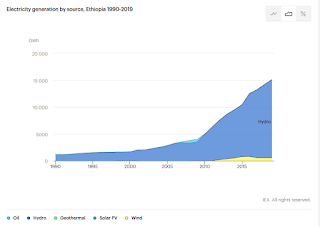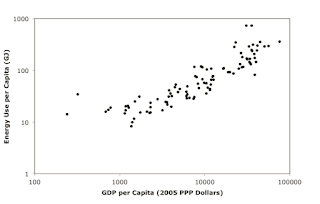Part 1 made the case for GERD in the short and medium term. Now for the really big picture
The human population of the Nile basin will probably double in the next century. Even if the Nile's water flow increases (some climate change scenario models indicate that rainfall could actually increase in the Nile basin over the next 50-100 years), it seems inevitable that demand will grow faster. And as mentioned in part 1, 100% of the flow is already being consumed. But this doesn't have to cause conflict. Globally, 70% of water use is for agriculture. So that's where the adjustments would have to be. From a natural resource optimization point of view, just like it doesn't make sense to grow almonds in California, or cotton in Kazakhstan, growing cotton and wheat in Egypt is probably not the most efficient use of water.
What do we mean by efficient? Imagine for a second the whole region was one country; if an allocation of water to different uses maximizes total benefit, i.e. there is no other allocation that has a larger total benefit, then that's an efficient outcome. To achieve this efficiency, obviously some water intensive agriculture should migrate to other regions. But of course, the Nile doesn't have one owner and we don't have perfect cooperation, so we can't expect individual players (a country or a farmer or a business) to sacrifice their immediate interest and give up some water use for the greater good. Game theory teaches us that an efficient resource allocation is useless if it is not feasible. And feasible means it's an equilibrium where each party benefits more from sticking to it than from deviating unilaterally.
What would such an equilibrium look like? It's not as simple as dividing it equally. For example, one issue is that if two people get the same amount of water, but one of them doesn't actually need it, that's a waste, i.e. inefficient. Even the notion of need, beyond bare survival, is subjective: you can argue about the relative merit of washing clothes, how often people should take a shower or bath etc.
Fortunately, there is a way to turn subjective values into an objective agreement: a price. What pricing mechanism might work in this scenario? For example, in a hypothetical v2.0 of the CFA all the countries in the basin could agree on a uniform Nile water tax. Each country would be liable to pay the tax for its total usage yearly. Of course, it would be up to each government to determine how the cost is distributed in its society: as a tax explicitly passed on to water consumers, or paid by general government revenue, or something in between. Passing the cost on is not as hard as it sounds since in most places that matter (homes and factories with running water, and farms with irrigation) water usage can easily be metered or is already. And non-consumptive uses like electricity generation would naturally be neutral.
To keep each other honest, the countries could easily agree on verifiable data sources. Egypt doesn't have to trust the metering in Ethiopia and vice versa, they could rely on aggregate measurements of the water balance, a lot of which can be done using currently existing satellite data that is freely available from neutral sources.
The revenue from this would be collected in a common fund and automatically redistributed to member countries in pre-set proportions. The proportions are negotiated in advanced and fixed, and of course that would be the hardest part of the whole deal. One basis for this negotiation could be a share proportional to the present fraction of the total Nile basin population in that country (not the total population, obviously as countries have different fractions of territory and population falling within the basin).
Naturally the price would have to be adjustable, say yearly, with a protocol agreed to in advance, so it regulates annual usage at sustainable levels i.e. below 100% of flow volume with a safety margin. If total usage is too high, the price goes up. If a lot of water goes unused, the price goes down. And if the total usage stays well below the sustainability level for a long time, the price would keep going down all the way to zero. This too is not as difficult as it may seem, it's basically the same idea as a carbon tax to fight climate change but much easier: the set of players that need to agree is much smaller (it's "only" 10 countries not 200), the consequences of water are immediately felt by all participants every year (unlike climate change which plays out over longer periods), and the target quantity is much easier to compute (total flow is well known, unlike the effect of different levels of greenhouse gases in the atmosphere which requires complex models with lots of uncertainty). (As an aside, the carbon tax itself is much better than cap and trade or carbon offsets, as I wrote on this blog a long time ago). With a pricing mechanism like that, no need for arguments about cotton in Egypt or irrigation in Ethiopia. Instead we would see a graceful phasing out of sub-optimal uses of water, and maximize the benefit of this shared resource.
Finally to further solidify the positive economics and minimize the negative politics of the system, the countries should facilitate investments and trade across the region. If for example investors from each basin country were free to invest in other basin countries in farming and industry while still supplying the outputs to their domestic market, there would be less political friction around the natural geographic distribution of agriculture and industrial production.
There are many examples of more complex cooperative agreements between countries around the world today, so it doesn't seem infeasible for the Nile basin countries to reach this kind of equilibrium. And recall we have plenty of time to achieve this long term goal, as the short term issue of GERD itself is win-win as discussed in part 1. But the chances of achieving this outcome will be greatly enhanced if in the meantime, the region's economies grow and become better diversified across farming, industry and services. Which brings us back to the present. Electrification is the sine qua non of developing a diversified economy. And GERD is a big step in the right direction, one which is immediately beneficial to not just Ethiopia but also Sudan and Egypt.




